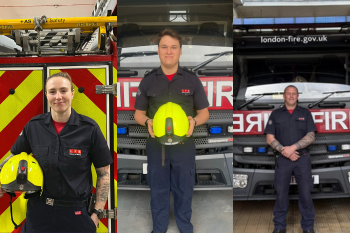This week is National Apprenticeship Week (NAW) – an annual celebration of all things apprenticeships. To mark the occasion, an Avon Fire and Rescue apprentice shares his unique story.
Apprenticeships today
A common misconception about apprenticeships is that they are aimed at school-leavers making their first foray into the world of work, typically in a technical or engineering role. These days, however, such an image couldn’t be further from the truth, with apprentices just as likely to be sat behind a desk as they are wearing overalls.
And whilst a recent study suggests that apprenticeships are now the favoured destination for a majority of 16–18-year-olds, it is increasingly common to see people in their twenties, thirties, forties, fifties, sixties and beyond going down the apprenticeship route in pursuit of a career change.
Andy’s career change
One among them is Avon Fire and Rescue’s Andy Dolman, who shares his story with us.
“I was working for myself previously,” says Andy, “doing property maintenance”.
Despite running a successful business, Andy had always harboured ambitions to join the fire and rescue service and was “trying for years” to land a wholetime firefighter position, whilst on-call at his local station in Chew Magna.
Firefighters can sometimes serve up to 20-30 years in the service, and so full-time openings can be scarce. Undeterred, Andy applied to become an on-call firefighter and was successful in landing the part-time role at Avon Fire and Rescue.
Having got a taste of life in fire and rescue on-call, an opportunity arose in April 2022 for Andy to take on a Level 3 Operational Firefighter apprenticeship, putting him on course to make it his full-time career.
About the Operational Firefighter apprenticeship
The two-year apprenticeship combined on the job learning responding to incidents in Bristol with eight hours of study per week at Weston College. The blend of classroom-based learning and on-the-job training was ideal grounding for the rigours of the job, according to Andy.
“On the job I learnt a lot about dealing with different scenarios and how to use equipment on the [fire engine] and got hands on running the station and maintaining all of our equipment,” he says.
“During our basic training, we developed a strong foundation in the statutory responsibilities of a firefighter, ensuring compliance with legal and procedural requirements. We also honed essential interpersonal skills, such as identifying individuals in need of additional support and making appropriate referrals to partner agencies, reinforcing our role in safeguarding, community fire safety and resilience.”
End-Point Assessment for firefighter apprenticeships
Whilst undoubtedly a fantastic opportunity, life as an apprentice firefighter can be tough. You are put through your paces, Andy tells me, and it’s a balancing act coping with the physical demands of the role and keeping on top of your studies.
As an apprentice approaches the end of their apprenticeship they are required to pass an End-Point Assessment (EPA), where an independent body (End-Point Assessment Organisation) examines whether they sufficiently meet the learning objectives required to pass and progress into their chosen careers.
Due to the support he received from his colleagues at Avon Fire and Rescue, Weston College, and SFJ Awards (the End-Point Assessment Organisation), however, it wasn’t so daunting a task in the end, Andy asserts.
“The EPA was quite nerve wracking in the run up to it,” says Andy. “It wasn’t as bad as we all thought it would be, and I felt a lot more at ease as the day went on.”
What’s next?
Despite finishing his apprenticeship a year ago, Andy remains eager to develop and learn.
“I really enjoy working for Avon Fire and Rescue. There is always lots to do but everyone who works here is helpful and there is always opportunity for development,” he continues.
Building a workforce for the future and providing opportunities for career development is a key benefit of apprenticeship programmes for employers, says Kit Salt, Head of Assessment at SFJ Awards.
“Apprenticeships are a vital way to support individuals to gain the skills required to join the emergency services, such as the police and fire and rescue services,” she says.
“The foundational skills that apprentices develop during their apprenticeships stay with them well into the future and helps them to develop and progress over the course of their entire careers.
“It’s fantastic too when former apprentices become mentors and role models and inspire future generations, bringing things full circle.”
Apprenticeships are for all
People may be surprised to learn that roughly half of all apprentices are over the age of 25. Given that a majority of apprenticeship starts in any given year are in this age group, it’s often the case that apprentices beginning their apprenticeship programmes are using it to upskill or are seeking out a career change.
“Regardless of age or career history, an apprenticeship is a platform to train to develop the skills for the career that you’ve always aspired to,” says Kit.
“I have worked in apprenticeships for over 20 years, and I can honestly say the sky’s the limit. There’s something out there for everyone.
“There are hundreds of apprenticeship roles available and new apprenticeships coming onboard each and every year. In 2024, SFJ Awards alone helped design and deliver a number of brand new apprenticeship standards.”
Has Andy’s story left you feeling inspired? Head to our apprentice hub to explore a variety of other apprentice stories and guidance on tackling your End-Point Assessment.
SFJ Awards are a leading End-Point Assessment Organisation for fire and rescue qualifications. Find out more about our services →





